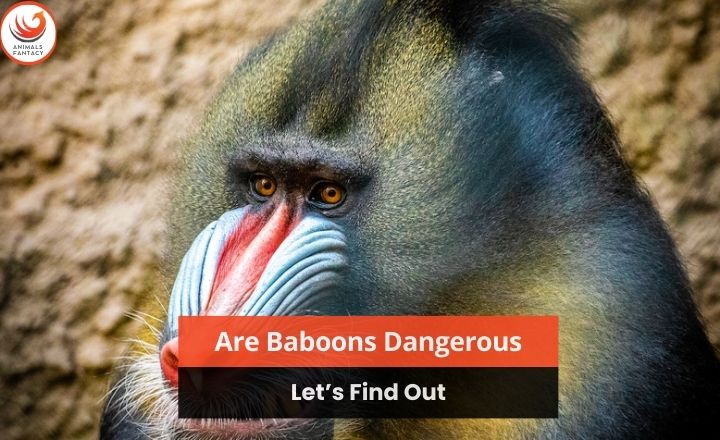Baboons look scary with their sharp teeth. they aren’t as dangerous as they appear. In this guideline, we will explore whether Are Baboons Dangerous.
This guide clears up misunderstandings about primates, especially about them being dangerous. We’ll look at how they behave, their habits, and how they interact with humans. Get ready to learn about baboons – it’s not as scary as you think!
Are Baboons Dangerous?
Baboons have sharp teeth that can cause serious harm, but don’t be too quick to judge. Baboons live in many places in Africa and the Arabian Peninsula. People often mistake their strong behavior and loud noises for unnecessary aggression.
Baboons are very social and usually live in big groups. They mainly want to keep peace in their group. But, they can be scary when they feel threatened or sense danger to their group.
To what extent can baboons be considered dangerous?
Baboons naturally follow a pecking order and are protective of their space. This can make them act defensively, which can be risky for people. If they feel invaded or threatened, they may react aggressively.
They have strong jaws, like lions, and can cause serious harm if they’re upset or trapped. But, it’s key to note that they don’t look for fights. They mainly react out of fear or if they think they’re in danger.

Their occasional aggression is more instinctive, not mean-spirited. The dangers of interacting with baboons can be managed if we understand their behavior. It’s exciting to watch these expressive monkeys closely, but keeping a safe distance keeps us safe and helps protect the balance of our varied ecosystems.
Tips for Ensuring Safety:
Baboons can be dangerous. They are smart, strong, and have sharp teeth for defense and attack. If a baboon feels scared, it can protect itself forcefully, so people should be careful around them. Here are some important safety tips when dealing with baboons. Don’t make direct eye contact as it’s seen as a threat in the primate world.

Baboons usually don’t attack unless they feel threatened, often when humans get too close or try to feed them. They are very smart and can defend themselves strongly if they sense danger. To stay safe around baboons, keep your distance, don’t feed them, and let them behave naturally.
Understanding Are Baboons Aggressive Or Not
Baboons are not naturally mean or dangerous to people. But, if they feel threatened or trapped, they might act out in self-defense. Their large size and sharp, dog-like teeth can make them seem scary. Interestingly, this aggressive behavior is usually part of their social system. Baboons often use it to show who’s in charge, rather than to fight.
Can Baboons Attack Humans?
Baboons are big monkeys and can be very aggressive, especially if they feel their space is under threat. They have sharp teeth, even longer than a lion’s, and can defend themselves against humans who enter their home.
They don’t usually hunt humans, but as cities expand into their habitats, encounters are becoming more common. Baboons are also getting used to being around people, which can lead to confrontations.

What is the Source of Baboons’ Fear?
Baboons may look strong with their large teeth, but they are not fearless. They are scared of predators like lions, hyenas, and leopards because of their size and power. So, are baboons dangerous? Yes, they can be if they feel threatened.
They may show aggression by showing their teeth and charging at the threat. But baboons don’t just fear physical danger. They also worry about their social standing in their group. Male baboons fight for power, which can make the lower-ranking members feel anxious.
Intelligence and Adaptation
Baboon society is smart and adaptable. It’s a lot like human society, with a clear pecking order. Changes in this order show both survival skills and intelligence. When baboons face fights within their species or changes in their environment, they show amazing physical skills and teamwork. This is something we’ve never seen in primates before.
Baboons (including Mandrillus and Theropithecus) have long muzzles mainly because they rely on tough, fibrous foods, and this length is further extended in males because of the use of the canines – which is mainly intraspecific, for masculine rivalry, and includes ‘fencing’ with the canines as a mode of fighting.02-Jul-2022
Baboon Attacks: A Response to Threats
Baboons are hazardous monkeys if left alone. they can become a serious threat if they feel threatened or if their families or territories are disturbed. mostly Baboon attacks humans are often a response to threats or disruptions in their habitats.
They mainly use aggression as lasMale baboons show a range of human-like emotions through their actions. They are natural leaders who bravely defend their group from threats. But their role goes beyond just protection.

They also help with grooming and caring for the young ones, tasks usually done by females. This shows a softer side that contrasts with their strong and potentially dangerous appearance. This mix of kindness and strength gives us a better understanding of these often misunderstood animals.
They resort to self-defense if they are scared or provoked. This should not be taken lightly. Their scary attacks, along with their sharp teeth, show how dangerous they can be in such situations.
What Are Baboons Afraid Of?
Baboons are known for their agility and fierceness, similar to dogs. But, are they dangerous? Yes, but they also have fears. They are scared of predators like leopards and cheetahs, who often hunt young or weak baboons.
Baboons are also afraid of water because they are not good swimmers, making them easy prey for crocodiles. Humans can also stress baboons out, creating a mutual fear.
Protective Male Baboons
Male baboons show a range of human-like emotions through their actions. They are natural leaders who bravely defend their group from threats. But their role goes beyond just protection. They also help with grooming and caring for the young ones, tasks usually done by females.
This shows a softer side that contrasts with their strong and potentially dangerous appearance. This mix of kindness and strength gives us a better understanding of these often misunderstood animals.
Final Words
Are baboons dangerous? Baboons aren’t naturally harmful to people, but they can become dangerous if they feel scared or trapped. Their big size, sharp teeth, and defensive behavior when guarding their group or looking for food can cause risky situations. So, it’s best to keep a safe distance from these animals in the wild and not feed them.
Also, saving their habitats and teaching the public about these interesting animals can help lessen fights between people and baboons. Remember: knowing more about them can lead to living peacefully together; let’s learn about them instead of being scared of them.
FAQs
What Kills Baboons?
Baboons often die due to different reasons. The main reason is being hunted by bigger animals. Large meat-eating animals like lions, leopards, and hyenas often hunt them. Even eagles, a type of bird, pose a threat. Baby baboons are especially at risk from these hunters.
How Dangerous Are Baboons?
Baboons can be dangerous like other wild animals, especially when they’re scared or guarding their babies. They have sharp teeth up to 2 inches long and are physically stronger than humans. If they feel trapped or annoyed, baboons can get aggressive and attack.
Can A Human Beat A Mandrill?
A person probably can’t win against a mandrill. Mandrills are the biggest type of monkeys with sharp teeth up to 2 inches long for protection. They are also strong and quick, making them tough opponents in a fight.
Do Baboons Attack Humans?
Yes, baboons have been known to attack humans in certain circumstances. Baboons are wild animals and can become aggressive if they feel threatened or if their natural habitat is encroached upon.
Are Baboons Dangerous To Humans?
Baboons can be dangerous to humans, especially when they feel threatened or cornered. They are strong and agile animals with sharp teeth and powerful jaws, capable of inflicting serious injuries if provoked.
Can Baboons Kill You?
Baboons can be dangerous and pose a threat to humans. They are strong and agile and may become aggressive when threatened or provoked. Baboons have sharp teeth and powerful jaws, so they could cause serious harm or be lethal to humans.
How Dangerous Are Mendrills?
Mandrills are big monkeys from Central Africa’s rainforests. They can be dangerous but usually don’t attack people. They have strong jaws and sharp teeth for self-defense. Remember, mandrills are wild animals, so be careful and respectful when you see them in the wild.
Are Baboons Dangerous To Dogs?
Baboons are dangerous to dogs because they are aggressive and strong. They are territorial and protective of their young, which can lead to conflicts with dogs that enter their area. Baboons have sharp teeth and powerful jaws that can seriously hurt dogs in a fight.
Can A Mandrill Kill A Human?
The mandrill has one of the greatest sexual dimorphisms among the primates. An average human would get slashed open and bleed to death. A top-tier human would win but might die from wounds later unless he is very careful.

